NO PLACE LIKE HOME?
A National University of Singapore department was impeded when it tried to organise a talk by me. It’s part of a standard screening process, I’m told.
It’s Friday 9 March. My calendar tells me I’m supposed to be delivering a lecture today at the National University of Singapore. The view from my window tells me I never left Hong Kong. My host was unable to go ahead with the event because official approval was not forthcoming — until 3pm today.
Although this turn of events has spared me a work trip I can do without, I wouldn’t be doing NUS any favours if I silently let the matter slide.
In December, the head of a research centre at NUS invited me to deliver a public lecture, as part of a series on the state of media in Asia. In 2015, he had accepted my invitation to speak at a conference I organised in Singapore, and I was happy to reciprocate.
We fixed the date — March 9. A couple of weeks later, I got this email: “Rest assured that your visit in March is being co-ordinated.” My suspicions were aroused by this assurance, since I’d not expressed any impatience. Was there some hitch, I now wondered. Sure enough, in mid-February, I was informed that “all visitors to the Faculty of Arts & Social Sciences [FASS] are subject to screening”.
A few days later, my host apologised for the hold-up. I could sense his frustration and helplessness. We agreed to wait and see.
A few days ago, he was forced to ask for a rain check, since there was no longer time to make my travel arrangements or publicise the talk even if suddenly we got the green light.
This afternoon, approval finally came, like the punchline to a bad joke.
No explanation was offered for the nature of the screening or why it had taken so long.
In my time as an academic, I have given talks on campuses in around 25 countries. This is the first time that an invitation to speak has been, in effect, voided. It’s the kind of hitch that I’m mentally prepared for if I need to deal with universities in the People’s Republic of China. I wasn’t expecting it from my own country. I wonder if we’ve hit a new low (and new heights of irony), when the NUS Faculty of Arts and Social Sciences, in which foreigners occupy half the head-of-department positions, can’t freely decide to have a Singapore citizen visit for a couple of hours to share his research.
I’ve been in this business long enough to know that, at this point in my story, two separate groups of readers will roll their eyes, for very different reasons. At one end of the spectrum are conservatives who have indestructible faith in our System. [1] The System, they’d suggest, must have good reasons for vetting academic talks.
At the other end of the spectrum are the cynics who’d laugh that I should have seen this coming, since Singapore’s totalitarian tendencies are well known. People would have to be daft to expect NUS to demonstrate any academic freedom, least of all toward someone known to be a critic of the government, they’d say.
Neither of these views is well founded, but I will address them seriously because they are both common obstacles to a productive debate about public discourse in Singapore.
First, though, I should share more details about the aborted event. Here are its title and abstract:
Rethinking censorship in an age of authoritarian resilience
Most discussions of media freedom implicitly contrast it to totalitarian control. While it is commonsensical to think of freedom as the opposite of tyranny, this binary model does not help us understand how modern authoritarian regimes sustain themselves. Drawing examples mainly from Asia, including Singapore [3], this presentation considers how media policies contribute to authoritarian resilience. Although not averse to exercising repression, these states also understand that maximum coercion is not optimal. They apply differential levels of censorship, allowing selective pluralisation to enhance their legitimacy among publics and co-opt large segments of the media industry, while stifling media and communication that would potentially challenge their political dominance.
The lecture was to be based on three forthcoming publications, ranging from 6,000–9,000 words each:
- “Journalism and Authoritarian Resilience”, in The Handbook of Journalism Studies, 2nd edition, edited by Karin Wahl-Jorgensen and Thomas Hanitzsch (Routledge).
- “Journalism, Censorship, and Press Freedom”, in The Handbooks of Communication Science: Journalism, edited by Tim P. Vos (De Gruyter Mouton).
- “Asian Journalism”, in The International Encyclopedia of Journalism Studies, edited by Tim P. Vos, Folker Hanusch, Margaretha Geertsema-Sligh, Annika Sehl, and Dimitra Dimitrakopoulou (International Communication Association & Wiley).
I should draw attention to the fact that all three manuscripts are being published in so-called handbooks/encyclopedias in my field. Such books have a distinct place in academic publishing. Unlike academic journals, they are not a venue for surfacing contentious new findings or avant-garde ideas. Instead, their editors invite experts to provide authoritative overviews of particular topics and to help shape the agenda for future scholarship. So, when a university impedes the presentation of such material, it’s not weeding out fringe theories (not that it should even do that) — it’s basically obstructing the main currents of that field.
Of course, the System is not obliged to put any academic work on a pedestal. But then academic events, like the one my host was planning, don’t do that either. They are not convened to endorse the presented research as Truth that is above criticism, but quite the opposite — to invite scrutiny and challenge. Repeating cycles of peer review are the lifeblood of scholarship. [3]
Having one’s work openly demolished with reasoned arguments is what scholars are prepared for. But it’s something else altogether to have to subject yourself to censors who get the final say on whether you can present your research or not, without needing to account for their verdicts. That’s the essence of an opaque screening process that is able to veto NUS faculty members’ decisions about whom to invite to speak at their events.
One would think that NUS professors, of all people, have earned some benefit of the doubt from the System. They have transformed the university into Asia’s number one. Even if we are skeptical about the details of university rankings, it’s quite clear that NUS is world-class. Indeed, there are few institutions of any kind in Singapore that have as strong a global reputation within their respective sectors. Universities are highly decentralised organisations, so NUS’s success could only have been achieved through the across-the-board excellence of its academics. It’s mystifying that its professors are not trusted to decide whom to invite as guest speakers.
Screening makes even less sense when we consider the quality of Singapore’s university students, who represent the top one-third in academic ability from an already-strong education system. Ten years’ experience teaching Singaporean undergrads tells me they need no shielding from the ideas of an academic like me; they are quite capable of making up their own minds. If the System does not share this confidence, I suspect it’s because its decision-makers are too distant from the young Singaporeans they are supposed to serve.
The above background should help answer the conservatives who are inclined to find excuses for the System. The only apparent benefit of a black-box screening process is to remind academics who’s boss. And since there are no explicit guidelines, staff are likely to second-guess the process by avoiding topics and speakers that may get caught in time-consuming red tape. Over time, a habit of self-censorship sets in.
None of this will be news to the other group of eye-rollers — the cynics who take it for granted that political control in Singapore is all-encompassing. The conservatives and the cynics may be at opposite ends of the ideological scale, but they are united in their indifference. When they hear people complain, both sides believe there is nothing remarkable to see here, and therefore nothing to say. But the cynics, like the conservatives, are wrong.
If social science and humanities departments in Singapore’s main university are required to have their academic visitors undergo non-academic vetting, yes, that’s certainly part of a larger pattern of control of our campuses (which we already know includes political screening of job applicants and disincentives for local scholarship), and part of an even larger culture that suppresses free thought through controls on media and public assembly. But it’s still important to register new data points that may reveal shifts in the political climate.
It is not true that academic events have always been subject to such vetting. I worked at NTU from 2004–2014 and never encountered any rule requiring us to seek permission before inviting a speaker. One of my colleagues had opposition politician J B Jeyaretnam speak in his media law class, for example. I asked a couple friends at NUS if they were familiar with the screening requirement that my talk had been subject to. They, like my host, were surprised to learn of it.
It’s equally untrue that this is simply the way Singapore is. Since moving to Hong Kong, I have flown back to deliver a keynote speech at a regional conference organised by the Institute of Policy Studies and sponsored by Temasek Foundation Connects, as well as seminars at the Singapore Institute of International Affairs and Singapore Management University. I’ve also spoken on panels organised by the Singapore Art Museum and ArtScience Museum. The treatment I’ve just received is not typical.
We know that there are sensitivities around foreign citizens being given a platform to talk about issues that the government deems controversial. The authorities equate such talks to foreign interference in Singapore’s domestic affairs. But this particular case does not fit that mould.
All said and done, like the conservatives and the cynics, I have no expectation that the System will feel any need to change course. I also know that most NUS faculty made their peace long ago with the way things are. Experience tells me that some will even apply their considerable intellect to finding creative justifications for the way the System works. Most will profess an understandable helplessness.
Having no illusions about the System’s inclination for self-reflection, I offer just one modest suggestion — that NUS make its policies more transparent.
Singapore’s academic community and its minders are free to develop their own norms regarding academic freedom. But why not have the courage of their convictions and openly declare the “standard procedure” (the term conveyed to me) that applies to visitors. Guest speakers should be informed at the outset that the invitation is subject to vetting that is outside the organiser’s control. They can then make an informed decision about whether to accept the invitation. Regardless of political orientation, surely we can agree that this is a professional courtesy that NUS owes to members of the global academic community.
UPDATES
Monday 12 March: I’ve been re-invited and have agreed to speak at NUS later this month. I was in two minds about whether to say yes, in case it’s seen as accepting of a process that treats Singaporeans this way. But I don’t doubt my host’s sincerity in inviting me. And, I’d like to believe that collegiality still has a place in academia.
Thursday 15 March: Subsequent media reports have quoted an NUS spokesman as expressing “regret” for the “unfortunate incident”, saying that “internal administrative processes took longer than expected due to an oversight”. NUS has not contradicted any part of the above article. (As some have asked, I should add that the spokesman’s statement to the press is the only communication I’ve seen from the NUS administration.) News reports have appeared in Singapore media (Channel NewsAsia, The Straits Times and Today) and Inside Higher Education.
Notes
[1] In this essay, I use the term “System” as shorthand for actors with the power to insert extraneous factors into the decision-making processes of formally autonomous institutions (such as universities and media), thus limiting their scope to act independently according to their professional norms and standards. The System’s actors may include top executives within the institution as well as government agencies and political masters. The System’s decisions are ultimately issued by the institution’s own administrators, and it is often difficult even for insiders to tell whether they have been explicitly prompted by government actors, or whether political priorities have been successfully internalised within the institution’s thinking such that no direct external intervention is required (resulting in “self-censorship”).
[2] My host had originally proposed that I speak about the Singapore media system. I said I’d prefer to go regional, in line with my current research: “Frankly I’m bored with talking about Singapore, since things don’t change much so I end up just repeating myself!”
[3] This is one reason why I welcomed the chance to present my research at a comprehensive university like NUS — to engage with scholars not just in my own field of communication, but also from its strong sociology and Asian studies departments, for example.
Those of us outside the establishment take it for granted that … organisations will invite us and then disinvite us.” – Me, in “Singapore, Incomplete”, page 99.

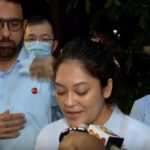
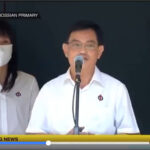

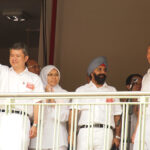
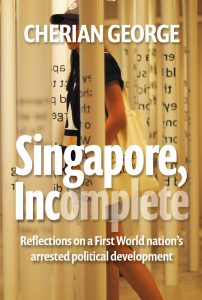
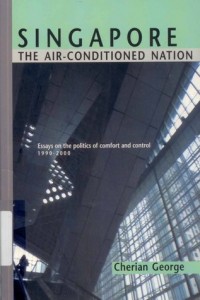
Comments are closed.